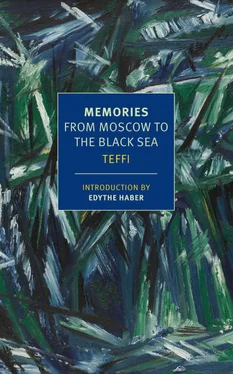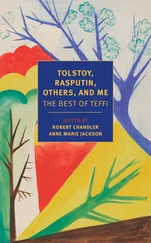After a period in Constantinople, Teffi reached Paris at the end of 1919 and, except for a short period in Germany in the early 1920s, lived in France until her death in 1952. Her weekly feuilletons and stories, published primarily in Paris émigré newspapers, as well as her many books, reestablished within the narrower circle of Russians abroad the immense popularity she had enjoyed in Russia. In her works she chronicled with her characteristic combination of humor and pathos—and at times with sharp, witty satire—everyday life in emigration. During her long decades in exile Teffi suffered the woes common among the Russian émigrés, especially of her aging generation—financial need, serious illness, lack of acceptance in her adopted country, and permanent separation from her beloved homeland, to which she could return only in her vivid, amusing stories. There she looked back to Russia of the past with nostalgia and affection, but almost never with easy sentimentality—in fact, sometimes with quite the opposite emotion.
In her 1947 essay, “Baba Yaga,” for example, Teffi treats as an inherent feature of the Russian character a violent drive to destruction not so very different from the elemental force that aroused such dread in Memories . [33] “Baba–Yaga,” Novosel’e , June 1947 (no. 33–34): 29–37. Repr. in Teffi’s last book, Zemnaya raduga (NY: Chekhov Press, 1952), 264–68. Translated by Robert and Elizabeth Chandler in Russian Magic Tales from Pushkin to Platonov , ed. Robert Chandler (Penguin, 2012), 213–17.
Her subject, Baba Yaga—the “terrible witch” from Russian folklore—is commonly considered to be the Russian “goddess of whirlwinds and snowstorms,” Teffi writes, and she at first laments that, unlike the beautiful Venus and Diana, the Russian goddess is such a “hideous, vicious old woman.” At the end, however, she evokes the lure of Baba Yaga’s destructive might. When she overturns the sleigh of a winter traveler on his way to see his sweet Mashenka, he is enchanted by the “free and wonderful… song of the blizzard.” The home and hearth promised by Mashenka mean nothing to him now: “Can he even remember her?… He feels both terrified and full of joy, and his soul sings and laughs. For never, never has it known such ecstasy.” He cries to Baba Yaga: “You are a GODDESS. Take me into your death—it is better than life.”
This celebration of the same elemental destructiveness so lamented in Teffi’s Memories is unnerving, but it is telling that not long before she wrote “Baba Yaga,” she touched upon an atrocity even greater than the Russian civil war—one that had only just been perpetrated by a “civilized” Western European country, Germany. In 1945, after seeing a film showing the Majdanek concentration camp, Teffi expressed particular horror at the orderliness of the Nazis’ annihilation machine—the “rectangular little houses at a correct distance from one another” with “a big factory chimney”—the crematorium—protruding in their midst. [34] “Tot svet,” “N. A. Teffi v gazete ‘Russkie novosti’ (1945–1947),” ed. E. G. Domogatskaia, in Tvorchestvo N. A. Teffi i russkii literaturnyi protsess pervoi poloviny XX veka , ed. O. N. Mikhailov, D. D. Nikolaev, E. M. Trubilova (Moscow: Nasledie, 1999): 214. Orig. pub. in Russkie novosti , Aug. 3, 1945 (no. 12): 4.
The fact that this “regular, clean little picture” was “thought up by man, created by human will” made it even “more horrifying than the heaps of skeletons.” The latter, after all, have been seen before “on battlefields or in countries swept by the cyclone of revolution,” but in such cases “chaos is the essential form, it cries out [that you are] stepping over the edge, over the brink of order, of common humanity.” And so the Nazis’ rationalization of evil and death makes even the chaos of the Russian civil war seem not as terrible.
—EDYTHE HABER

Teffi in Petersburg, 1915
THE AUTHOR considers it necessary to warn readers that in Memories they will not find famous historical figures or the deeply significant words such figures were said to have uttered. Nor will they find any elucidations and conclusions or refutations of this or that party line. They will find only a simple and truthful account of the author’s involuntary journey across the entire expanse of Russia—a journey she made along with millions of other ordinary people.
And readers will find in these pages, with very few exceptions, only ordinary unhistorical people who struck her as amusing or interesting, and incidents and adventures that seemed entertaining; and if the author has to speak of herself, this is not because she believes she is of interest to the reader, but only because she took part in the incidents described and absorbed the impressions made by these people and these events—and the removal of this axis, this living soul, would make the whole story go dead.
MOSCOW. Autumn. Cold.
My Petersburg life has been liquidated. The Russian Word has been closed down. [1] The Russian Word was a liberal Moscow daily newspaper, eventually closed down by the Bolsheviks. See Introduction, p. x.
There is, it seems, no possibility of anything.
Or rather, there is one possibility; it appears, day after day, in the shape of a squint-eyed Odessa impresario by the name of Gooskin, who is trying to persuade me to go with him to Kiev and Odessa and give public readings there.
“Had any bread today?” is how he begins, in a tone of foreboding. “Well, tomorrow you won’t. Everyone who can is going to the Ukraine. Only no one can. But you … You’ll be going there by train. I’ll be paying you sixty percent of gross takings. I’ve already telegraphed the Hotel London to reserve you the best suite. The sun will be shining, you’ll be beside the sea, you’ll read people one or two of your stories… You’ll take the money, buy yourself some ham and some butter—and then you’ll be sitting there in a café, eating away to your heart’s content. What’s to lose? Everyone knows me—just ask your friends. My pseudonym is Gooskin. I could tell you my real surname too, but it’s terribly long and difficult. For the love of God, let’s go! The best suite in the International!”
“But you said the Hotel London!”
“All right then, the London. Do you have something against the International?”
I ask around for advice. There truly are a lot of people desperate to get to the Ukraine.
“This pseudonymous Gooskin of mine,” I demur. “There’s something odd about him.”
“What do you mean?” people of experience reply. “He’s no odder than any of the others. They’re all the same, these petty impresarios.”
It’s Averchenko who puts an end to my doubts. [2] Arkady Averchenko (1881–1925), a comic writer and playwright, founded two journals, Satirikon (1908–1913) and New Satirikon (1913–1918), to which Teffi contributed regularly.
It turns out that he’s being taken to Kiev by some other pseudonym. He too is going to give public readings. We decide to go together. Averchenko’s pseudonym is also taking along two actresses, to perform short sketches.
“You see!” says Gooskin triumphantly. “Now all you need do is apply for your permits and everything will go swimmingly—like a knife through bread and butter.”
I have to say that I hate all kinds of public appearances. Why, I don’t know. It’s a quirk of mine. And as for this pseudonymous Gooskin with all his talk of percentages, or, as he himself puts it, “precentages”… But everyone around me is saying, “You’re so lucky, you’re going!” Or “Lucky thing, in Kiev they have pastries filled with cream!” Or even just “Lucky thing… with cream!”
Читать дальше













